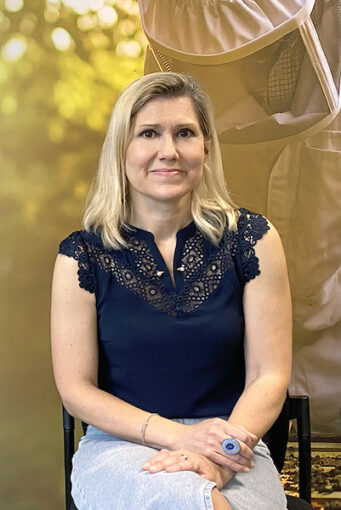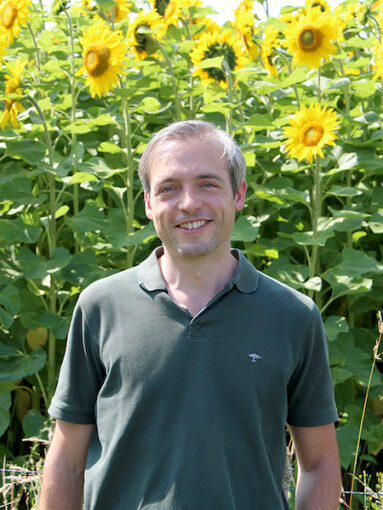 by Véto-pharma
by Véto-pharma Today, the Véto-pharma apiary celebrates ten years of research and innovation dedicated to the health of bees, which is essential to our biodiversity. Faced with challenges posed by parasites such as varroa mites, predators like the Asian hornet, and climate and environmental changes, Véto-pharma has embarked on a relentless quest to find new solutions. This veterinary laboratory has made bee health its central mission, combining know-how, science, passion, and innovation. Above all, it is a human adventure involving various teams that are more committed than ever to sustainable beekeeping.
Behind every success story are exceptional men and women who demonstrate an unwavering commitment to offering innovative solutions to beekeepers. From the project’s launch in 2013, a dedicated team oversaw the installation of the apiary and the first 100 colonies. This team also recruited the first member of the apiary team just weeks after the hives were set up.
Then, the apiary team consists of researchers, engineers, and beekeeping technicians who develop new bee health products and manage the monitoring of trials and the apiary, which now numbers 380 colonies.
Find the testimonials from those involved in the apiary, including a video featuring Gaël Charpentier, the first member of the apiary team in 2014 and now Head of Beekeeping, and Rémi Padé, Head of Bee Research and Innovation Pole. A qualified agricultural engineer, Rémi joined the team in 2017.
You could also discover the testimonials of Séverine Délot, Communications Manager and amateur beekeeper, and Ludovic De Féraudy, Sales Manager in France in 2014, who worked together on the apiary project.


Séverine : Setting up the experimental apiary was a fantastic project that Ludovic and I embarked on together in 2013. While Ludovic handled budget studies for equipment and colonies with various service providers, we coordinated all the steps jointly from inception to the installation of the 100 hives, in which we were actively involved
Séverine: The first stage of the project was to define the size of operation we wanted, based on our objectives, and to draw up a budget and an action plan for managing the project, including a timetable. Timing the installation of the colonies with the beekeeping season was crucial for their smooth development in the spring.
Ludovic: The next step was identifying suitable locations for the colonies, considering factors like water resources, food availability, good exposure, and land characteristics. We sourced locations around Chaillac within a 20 km radius for logistical ease. The commune of Chaillac supported us by offering communal land on a former industrial estate converted into a nature reserve, and local private owners also provided land.
Séverine: The third priority was finding a local swarm breeder. Given the scarcity of beekeepers in southern Indre, we contacted a breeder in the neighbouring Haute-Vienne department, about 40 minutes from Chaillac, which was logistically feasible.
Ludovic: The fourth stage involved ordering 100 complete hives and installation supports, which were delivered directly to the swarm producer for colony insertion.
Séverine: The fifth stage was installing the hives on the available plots. This required careful scheduling to ensure the bees were least active during the transfer, maximizing the population in each hive.
Ludovic: The final stage was to find a candidate with the right experience to manage the stock and set up and run the trials.
Séverine: The project itself was a big challenge because it went beyond my usual remit and was a bit of an unknown for me. However, the fact that Ludovic and I were working together meant that I could benefit from his experience in beekeeping and manage the different stages of the project as effectively as possible. The other challenges were more organisational and logistical.
Ludovic: Firstly, finding suitable land to set up the colonies. In this part of the Indre region, the land is mainly made up of hedged farmland and a few plots of arable land, with a limited food source (nectar and pollen) over the season for the bees. We had to find land that wasn’t too steep, big enough for 20 to 30 colonies, with a watering hole nearby, easily accessible by vehicle and protected from wild animals (wild boar). We did our best, but it was difficult for some sites to meet all the best criteria. We followed the advice of Philippe Fauchère, an experienced beekeeper in the region.
We then recruited a beekeeping technician with significant experience to manage the colonies and trials. Our search began in the early stages of the project. We had very few applicants, for geographical reasons.
Ludovic: We prioritized local suppliers, seeking quality products that were sustainable and within budget.
Séverine: Good weather was on our side. Timing was crucial to respect the bees and minimize stress during transport. We collected and installed the first 50 hives early in the morning and the other 50 hives later in the evening to ensure maximum worker bee presence.
Ludovic: Shortly after setting up, we faced bad weather and lacked immediate access to syrup, but managed to feed the bees just in time. Collaboration with local beekeeper Pascal Brunie was invaluable before hiring Gaël Charpentier.
Séverine: The most rewarding moment was installing the last hive, knowing that everything had gone according to plan.
Séverine: I expanded my knowledge of beekeeping. It confirmed that planning a project as realistically as possible limits stress and gives good visibility and clarity to the different actions. Teamwork and collaboration are vital. Stepping out of one’s comfort zone requires perseverance and determination, but the results are rewarding. Above all, it’s been an incredible human adventure, and I’m very proud to see what the apiary has become today. The project has become a cornerstone of Véto-pharma’s research, supporting bee health and beekeepers.
Séverine and Ludovic: Seeing the apiary’s development today with a dedicated full-time team of experts and knowing we were involved in its inception.
Séverine and Ludovic: This experience confirmed the importance of organization, planning, communication, and collaboration. Clearly defined tasks and collective decision-making drove our success.
Séverine: I have excellent memories of this project, even though it was initially a bit of an unknown. The most memorable moments were when I saw all the equipment being unloaded from the lorry and then the day of installing the hives, where everything had to be organised according to the time of day and the hive’s life.
Ludovic: I’m installing the hives on the sites for the first time, seeing the bees come out to gather food, and thinking to myself, ‘Here we go!’
Séverine: It was an incredible human adventure engraved in my memory. I still feel like I’m there when I visit the apiaries. After smoking the hives when they were set up, I felt like I’d spent the whole day as a smoker.
Ludovic: In 12 years of adventure at Véto-pharma, the apiary has been the proudest achievement. Séverine and I built it from scratch. The apiary and lab are now central to the company’s strategy, and the people who work there are fantastic.